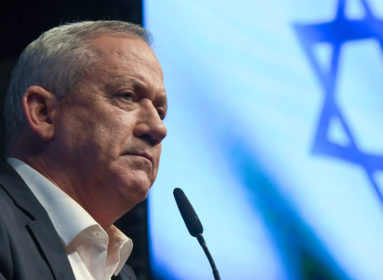By Cindy Mindell

Irving Glazer shows off his French Legion of Honor medal and a circa 1944 photo of himself in his army uniform.
SHELTON — Irving Glazer was 22 when he jumped off a landing craft into chest-deep water to slog 100 yards inland to the Normandy shore, zigzagging as German soldiers shot from the dunes above the beach.
He and his fellow army engineers, each laden with 70 lbs. of mine-sweeping equipment, had been washed a half-mile south and off course in the stormy English Channel. But his company, the 531st Engineer Shore Regiment, managed to establish the Tare Green beachhead, the northernmost of three military footholds dug into “Utah Beach” by the 1st Engineer Special Brigade on June 6, 1944.
Glazer swept for mines all day, ducking from small-arms fire and shelling. He turned over the 40 lbs. of plastic explosives he carried to a naval demolition team, who cleared German barricades for the 4th Infantry Division waiting on ships offshore. At sunset, Glazer dug a foxhole in the sand, where he dozed upright, standing on his helmet to avoid the seawater at the bottom of the pit.
He remembers the barrage balloons overhead, tethered to the beach by metal cables and deployed to protect the beach from strafing aircraft. The little rubber zeppelins couldn’t do much to defend against higher-flying bombers, though, leaving Glazer feeling only partially safe.
“I heard a loud roar I’d never heard before, and it was getting louder, and I thought, ‘It sounds like airplanes. If it’s the Germans, they’re coming to bomb us; if it’s the Americans, we’re all right,’” recalls the 92-year-old veteran. “It was coming from the English Channel, and it was a sight to see – there were so many planes that one general said you could have walked from England to France on the backs of those planes.”
As General Theodore Roosevelt, Jr. would famously declare that day on Utah Beach, with his advance units landing south of the intended target, “We’ll start the war from right here!”
Glazer, a Bridgeport native and Shelton resident, was among 34 living American veterans honored recently by the French government for their role in liberating France during World War II. The veterans received the French Legion of Honor medal by Bertrand Lortholary, Consul General of France in New York, and Guy Wildenstein, President of the American Society of the French Legion of Honor.
The May 9 Legion of Honor ceremony, held at the United States Military Academy at West Point, came a day after the anniversary of V-E Day and a month before the 70th anniversary of D-Day.
The highest order of France, the French Legion of Honor (Légion d’honneur) was first established by Napoleon Bonaparte in May 1802 and comprises five classes: Chevalier (Knight), Officier (Officer), Commandeur (Commander), Grand Officier (Grand Officer) and Grand Croix (Grand Cross). The highest degree of the Order of the Legion of Honor is that of Grand Master, which is held by the sitting President of the Republic.

Irving Glazer’s “DDAY44” license plate has attracted honks and thumbs-up gestures from passing drivers.
Foreign nationals who have served France may receive a distinction from the Legion of Honor. American recipients include Generals Dwight D. Eisenhower and Douglas MacArthur, Admiral Michael Mullen, and, as an institution, the United States Military Academy at West Point.
Today, there are approximately 93,000 living Legion of Honor recipients. American veterans who risked their lives during World War II fighting on French territory qualify to be decorated as Knights of the Legion of Honor. Veterans must have fought in one of the four main campaigns of the Liberation of France: Normandy, Provence, Ardennes, or Northern France.
Glazer was one of two Connecticut residents recognized at the West Point ceremony. This is not the first honor he has received for his military service; he was presented with the Operation Overlord Medal, issued by the town of Caen in 1994, 50 years after liberation. He learned of the French government’s plan to honor American veterans more than a year ago, and submitted the lengthy application outlining his wartime activity to the New York consulate. It took a year to review and validate the details, but Glazer finally received a letter notifying him that he qualified for the honor.
Glazer spent a total of two and a half years in Europe with the 4th and 9th Infantry Divisions, moving from Utah Beach through France and then to Belgium, Holland, Luxembourg, and Germany, defending and rebuilding bridges, repairing roadways, serving as a jack-of-all-trades wherever needed. Once drafted, he wanted the chance to serve in Europe.
“Word got around that the Jews were having a bad time,” he says. “There were pieces in the paper about Kristallnacht. I knew that this was going on and I hoped that, if I shipped out, I would go to Europe to help.”
Glazer and his outfit searched the Hadamar Euthanasia Center once U.S. forces had captured the German town in April 1945. There, he saw cremation ovens and a mass gravesite and learned that the facility had been used for mass sterilizations and mass murder of some 200,000 “undesirable” German adults and children.
At war’s end, no longer needed as an engineer, Glazer played an army-issue saxophone in a couple of dance bands. (When he was discharged at the Fort Devens Separation Center in 1946, Glazer discovered that he had originally been assigned to the U.S. Army Band. He says he’s glad he was trained as a combat engineer and demolition specialist instead.)

Visselle Glazer’s brother, Alfred Gold z”l, is buried in a section of Fairfield’s Loyalty Lodge Jewish Cemetery reserved for casualties of war.
He returned to his native Bridgeport, where he met Visselle Gold, whose older brother Alfred had been killed in action in Sicily in 1943. The two married at Congregation Rodeph Sholom in 1952 and raised two sons and a daughter, celebrating their b’nai-mitzvah and weddings at the same synagogue. Glazer worked as a radio and TV repairman, enrolling in night school at the Bridgeport Engineering Institute (now part of Fairfield University), where he earned his electrical engineering degree at age 54.
Glazer’s “DDAY44” license plate has attracted honks and thumbs-up gestures from passing drivers. People come up to the car to thank the veteran, and some especially grateful diners have paid the Glazers’ restaurant tab on more than one occasion.
The recognition is not over yet. The Glazers plan to attend the 70th-anniversary D-Day tribute at Liberty Island in New York Harbor, organized by the New York-based non-profit, “The French Will Never Forget.” (Sneak peak: one million rose petals will be dropped over the Statue of Liberty by a French military helicopter.)
The Legion of Honor was the first modern order of merit created to reward soldiers and civilians, and flying in the face of the French monarchy, whose prizes were reserved for Roman Catholics and knights of noble title. To his critics and doubters, Napoleon famously declared, “You call these baubles; well, it is with baubles that men are led… Do you think that you would be able to make men fight by reasoning? Never. That is good only for the scholar in his study. The soldier needs glory, distinctions, rewards.”
There is something especially rewarding for Glazer in having survived not only the D-Day invasion and two more years of war, but also long enough to be honored for his service.
Like many Jewish GIs, he was denied opportunities because of anti-Semitism. During basic training at Fort Dix in New Jersey, he was intentionally barred from the Air Force qualifying exams.
“Another time, I had a little argument with another guy and he swore and said, ‘You no-good Jew,’ and that was too much for me,” Glazer recalls. “I hit him and that was my mistake. Because I initiated the punch, I was going to be up for corporal and I lost that and went back to PFC [Private First Class]. Being a demolition specialist, I should have been a corporal technician, but I didn’t want to fight it and when I got my discharge papers, I just wanted out.”
Like so many men of his generation, Glazer lost some of his youth while fighting for his country. Do the medals serve as compensation of a sort?
“The first one, for the 50th anniversary, made up a little bit,” he says. “The organizers were nice to us when we were there, they gave us a tour of the D-Day area and monuments, they gave us front-row seats to a show and that was very nice. The Legion of Honor makes up a lot.”
Comments? cindym@jewishledger.com.








 Southern New England Jewish Ledger
Southern New England Jewish Ledger









